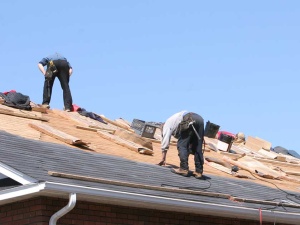As experts in the roofing industry, we often field questions about the sustainability initiatives within our sector. A common inquiry pertains to what happens to old asphalt shingles once they’re removed from a roof where conscientious disposal practices are increasingly important. Well, the answer lies in the innovative and environmentally friendly process of asphalt shingle recycling.
The Importance of Asphalt Shingle Recycling
According to the Asphalt Roofing Manufacturers Association (ARMA) and General Kinematics, U.S. roofing manufacturers and roof tear-offs contribute to approximately 11 million tons of shingle waste annually. In Kansas City and elsewhere, these shingles, removed from aging or damaged roofs, find new life through recycling.
Asphalt Shingle Recycling: A Step-by-Step Process
When roofing contractors remove old asphalt shingles, these materials need not end up in landfills, where they can take centuries to decompose. Instead, they are collected and transported to specialized recycling centers. Here’s the asphalt shingle recycling process in detail:
Collection and Sorting of Shingle Waste
The effectiveness of asphalt shingle recycling begins with proper waste collection. Roofers need to separate the asphalt shingles from other construction debris. This separation ensures that non-asphalt components don’t jeopardize the quality of the recycled material.
Grinding Shingles Into Usable Material
Once collected, the shingles undergo grinding processes—where sophisticated equipment transforms them into smaller particles appropriate for various applications. Shingle grinders play a vital role in processing the abrasive shingle material, which can then be used as an aggregate in hot-mix asphalt (HMA) for road paving.
Turning Waste Into Road Repair Material
Most notably, recycled shingles are used for paving activities, such as repairing and constructing public roadways, driveways, and parking lots. This not only extends the useful life of the material but also helps preserve virgin asphalt, reducing the demand for this nonrenewable resource.
The Environmental and Economic Benefits
ARMA reports a significant rise in shingle recycling, which is leading to substantial environmental benefits—like the conservation of approximately 2.2 million barrels of virgin asphalt. From an economic perspective, using recycled asphalt shingles in road projects can also reduce municipal costs for infrastructure repairs and create local jobs in the recycling and construction sectors.
Encouraging Sustainable Practices in Roofing
As Kansas City roofing contractors, it is our duty to promote and participate in sustainable roofing practices. By supporting shingle recycling, roofing contractors not only contribute to a more sustainable environment but also align with conscious consumers and industry trends aimed at reducing waste.
Recycling old asphalt shingles is crucial to building a more sustainable roofing industry. It’s a prime example of how we can turn construction-related waste into a resource that benefits the community, industry, and environment. Easton Roofing has an important role to play in ensuring the successful recycling of asphalt shingles and in educating consumers about their green benefits. Call us at (913) 933-8065, or visit our contact page to schedule a consultation.






























